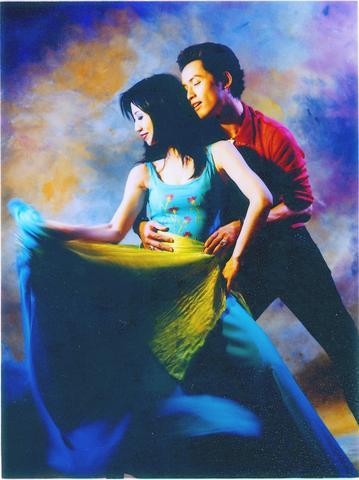Fuego Fantastico's (迷火佛朗明哥舞坊) large-scale performance of Love Me or Die -- A Taiwanese Flamenco Theater (台北地圖之尋找潘金蓮) marks the first flamenco theater performance in the world adapted from classic Chinese literature and sung in Chinese, and demonstrates just how localized the art of flamenco dance can be.
Led by the founders of Fuego Fantastico, Lee Shin (李昕) and Lin Keng (林耕) and joined by renowned musical actor Wang Po-sen (王柏森), there will be four performances at The Chungshan Hall (中山堂) from 2:30pm tomorrow, incorporating live music, singing and a large amount of flamenco dance.

PHOTO COURTESY FUEGO FANTASTICO
Taipei-based Just Music Philharmonic Orchestra (宙斯愛樂管弦樂團) -- made up of harp, violins, flute, percussion and of course clappers -- will be playing live on stage. The music is composed by Joe Lee (李哲藝), music director and harpist of the orchestra. Flamenco guitarist Chan Che-hsiung (詹哲雄) will also join the orchestra adding more flamenco flavors.
If Carmen is traditionally the key female figure in most flamenco stories, what Lee Shin and Lin Keng have tried to do is transform the character of Carmen into a Chinese character personified by Pan Chin-lien (潘金蓮) -- or rather, the leading woman in 17the century Chinese erotic literature, The Golden Lotus (金瓶梅).
"Like Carmen, Pan Chin-lien is a woman who dares to express her desire and body, and who is not afraid at all about love and death," said Lee Shin about adapting Chinese literature to the flamenco stage.
In ancient literature, Pan was a woman who was involved with three men: Wu Ta-lang (武大郎), her husband, whom she kills; Hsih-Men Ching (西門慶) the lecherous lover of Pan; and Wu Sung (武松), Wu Ta-lang's younger brother, whom Pan tries and fails to seduce.
The image of Pan in Chinese culture is frowned upon. She is seen as lascivious, and evil. But here, Lee tries to spin a feminist angle.
"She is passionate, pursuing her own happiness and wanting to be the master of her own destiny. In the West, Carmen is considered a goddess, whereas in Chinese culture Pan Chin-lien is seen as a vicious woman," Lee said.
In Love Me or Die, Lee portrays the role of Pan. Twenty of her students from the dance studio will also dance together with her, sometimes portraying the critical voices condemning Pan, and other times showing the different desires inside Pan's heart.
Wang, a familiar face in the musicals of Godot Theater (果陀劇場), portrays the womanizer Hsih-Men Ching. Lin Keng, the art director of Fuego Fantastico, is in charge of choreography and is also another leading man in the performance, playing Wu Sung, Pan's righteous brother-in-law. Lin is one of the few outstanding male flamenco dancers based in Taiwan.
"Flamenco is about an inner force, a repressed yet very powerful desire and feeling. So, we think it is an art form most suitable to illustrate the story of Pan Chin-lien," said both Lee and Lin.
The Cuadro Flamenco Fuego Fantastico studio was set up in 1994 by Lee Shin and Lin Keng. It is the first private flamenco studio in Taipei. Over 3,000 students have enrolled in the past five years and it has expanded into three schools (two in Taipei, one in Taichung).
Performance notes:
What: Love Me or Die -- A Taiwanese Flamenco Theater.
When: 2:30pm to 4pm, June 19 and June 20; 7:30pm to 9pm, June 19 and June 20.
Where: Chungshan Hall, Taipei City, 98 Yenping S Rd, Taipei City
Tickets: NT$400 to NT$1400, available at ERA ticketing outlets.

Google unveiled an artificial intelligence tool Wednesday that its scientists said would help unravel the mysteries of the human genome — and could one day lead to new treatments for diseases. The deep learning model AlphaGenome was hailed by outside researchers as a “breakthrough” that would let scientists study and even simulate the roots of difficult-to-treat genetic diseases. While the first complete map of the human genome in 2003 “gave us the book of life, reading it remained a challenge,” Pushmeet Kohli, vice president of research at Google DeepMind, told journalists. “We have the text,” he said, which is a sequence of

On a harsh winter afternoon last month, 2,000 protesters marched and chanted slogans such as “CCP out” and “Korea for Koreans” in Seoul’s popular Gangnam District. Participants — mostly students — wore caps printed with the Chinese characters for “exterminate communism” (滅共) and held banners reading “Heaven will destroy the Chinese Communist Party” (天滅中共). During the march, Park Jun-young, the leader of the protest organizer “Free University,” a conservative youth movement, who was on a hunger strike, collapsed after delivering a speech in sub-zero temperatures and was later hospitalized. Several protesters shaved their heads at the end of the demonstration. A

In August of 1949 American journalist Darrell Berrigan toured occupied Formosa and on Aug. 13 published “Should We Grab Formosa?” in the Saturday Evening Post. Berrigan, cataloguing the numerous horrors of corruption and looting the occupying Republic of China (ROC) was inflicting on the locals, advocated outright annexation of Taiwan by the US. He contended the islanders would welcome that. Berrigan also observed that the islanders were planning another revolt, and wrote of their “island nationalism.” The US position on Taiwan was well known there, and islanders, he said, had told him of US official statements that Taiwan had not

We have reached the point where, on any given day, it has become shocking if nothing shocking is happening in the news. This is especially true of Taiwan, which is in the crosshairs of the Chinese Communist Party (CCP), uniquely vulnerable to events happening in the US and Japan and where domestic politics has turned toxic and self-destructive. There are big forces at play far beyond our ability to control them. Feelings of helplessness are no joke and can lead to serious health issues. It should come as no surprise that a Strategic Market Research report is predicting a Compound